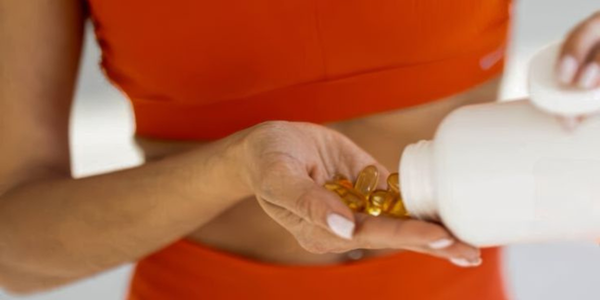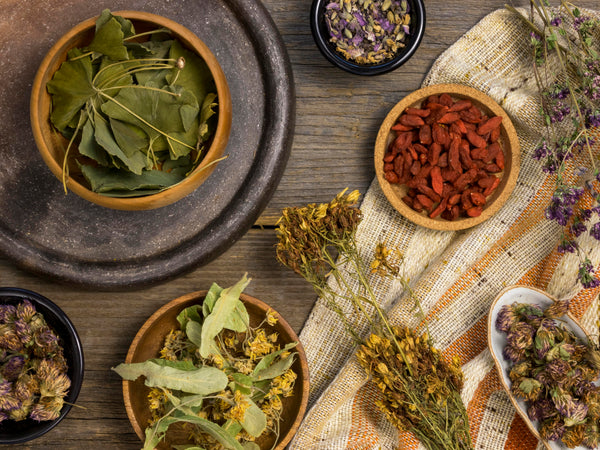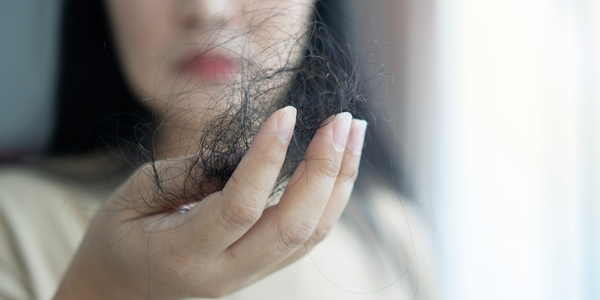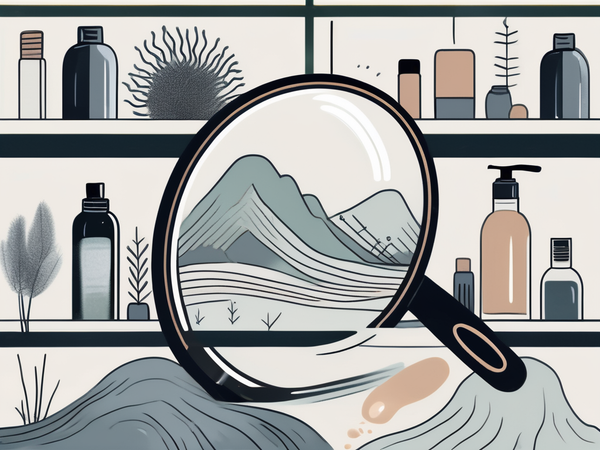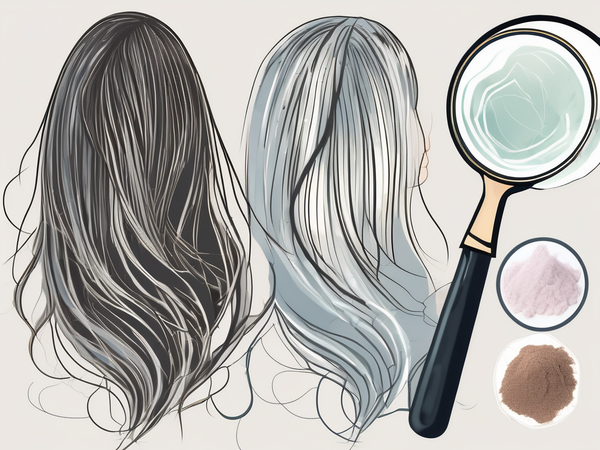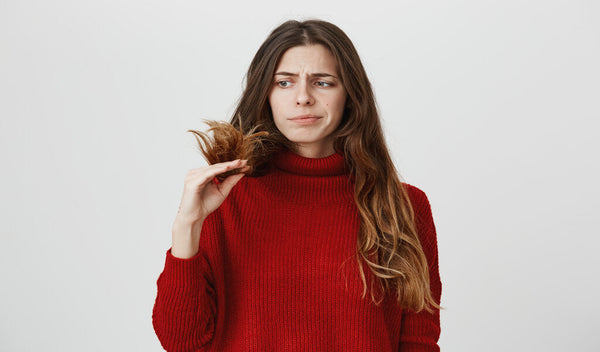Are you stuck in the vicious loop of “Don’t stress—it’ll make your hair fall worse,” and “But hair fall is making me stress, which is making my hair fall worse”? We get it—it’s exhausting! You’ve probably been bombarded with social media ads promising miracle oils and serums, and maybe you’ve even tried a few (or more). Yet here you are, pulling more hair out of the shower drain every day, wondering why nothing seems to work.
Here’s the thing: hair fall isn’t just a surface-level issue. While oils and serums might help to an extent, the real secret to healthier hair lies within—literally. Your hair needs the right nutrients to thrive, and sometimes vitamin deficiencies are the silent culprits behind that relentless hair fall. So let’s dive into why being healthy on the inside is just as important as those topical solutions—and how you can finally tackle hair loss for good!
What Causes Hair Loss?
Hair loss is a multifaceted issue influenced by several factors, ranging from genetics to lifestyle choices and nutrient deficiencies. Let’s break it down further:
1. Genetics
One of the most common causes of hair loss is hereditary conditions such as male or female pattern baldness, also known as androgenic alopecia. If hair loss runs in your family, there’s a higher likelihood you’ll experience it too. This condition typically occurs due to sensitivity to dihydrotestosterone (DHT), a hormone that shrinks hair follicles over time. While genetics are beyond your control, understanding your predisposition can help you take preventive measures early.
2. Stress and Lifestyle
Ever noticed how your hair sheds more during stressful periods? Chronic stress disrupts your hair growth cycle, pushing more strands into the shedding phase. Lifestyle factors like poor sleep, excessive heat styling, and crash dieting can also weaken hair follicles. Without proper care, these habits can accelerate hair thinning and make hair more prone to breakage.
3. Vitamin Deficiency
Your hair needs proper nourishment to grow, and a lack of essential vitamins can wreak havoc on your strands. Nutrient deficiencies, often caused by poor dietary habits or medical conditions, interfere with the hair growth cycle. Over time, this leads to weaker roots, thinning hair, and breakage. Addressing these deficiencies is crucial for maintaining healthy, strong hair.
The Role of Vitamins in Hair Health
Vitamins are the building blocks of healthy hair. They nourish your follicles, strengthen your strands, and support the overall growth process. Here’s a closer look at the essential vitamins for hair health:
1. Vitamin A
Vitamin A promotes the production of sebum, a natural oil that keeps your scalp hydrated and nourished. A well-hydrated scalp creates an optimal environment for hair growth and prevents dryness and flakiness. However, too much Vitamin A can lead to hair loss, so it’s important to get the right amount.
Sources: Carrots, spinach, sweet potatoes, and mangoes.
2. B Vitamins (Biotin)
Biotin, a key B vitamin, is essential for keratin production, the protein that forms the structure of your hair. It strengthens hair, reduces breakage, and supports follicle health. Deficiency in Biotin can lead to brittle hair and even hair loss.
Sources: Eggs, almonds, walnuts, whole grains, and seeds.
3. Vitamin C
This antioxidant powerhouse is critical for collagen production, a protein that strengthens the structure of hair strands. Vitamin C also helps your body absorb iron, a mineral vital for preventing hair loss. Plus, its antioxidant properties protect hair follicles from free radical damage.
Sources: Oranges, guavas, bell peppers, strawberries, and kiwis.
4. Vitamin D
Known as the “sunshine vitamin,” Vitamin D plays a significant role in the creation of new hair follicles. Low levels of Vitamin D are often linked to alopecia, a condition that causes severe hair loss. Ensuring sufficient Vitamin D levels can stimulate dormant follicles and support new growth.
Sources: Fatty fish (like salmon and mackerel), mushrooms, fortified dairy products, and sunlight exposure.
5. Vitamin E
Vitamin E is essential for improving blood circulation to the scalp, ensuring that hair follicles receive the nutrients they need to grow. It also provides antioxidant protection, reducing oxidative stress that can damage hair follicles.
Sources: Almonds, sunflower seeds, avocados, and leafy greens.
Signs of Vitamin Deficiency Leading to Hair Loss
Recognizing the symptoms of nutrient deficiencies early can help you take timely action. Here are some common warning signs:
-
Increased Hair Thinning or Shedding
If you notice more strands on your pillow, hairbrush, or shower drain than usual, it could be a sign of insufficient vitamins, particularly Biotin, Vitamin D, or Iron. -
Slow Hair Growth
Hair that grows slower than usual or appears to be stuck in a growth plateau may signal deficiencies in Vitamin D, B vitamins, or other essential nutrients. -
Dry, Brittle Hair
Without enough Vitamin A or Vitamin E, your scalp may struggle to produce the natural oils needed for hydration. This can result in dull, brittle, and easily breakable hair. -
Scalp Issues Like Dandruff or Itchiness
A flaky or itchy scalp often points to low levels of Vitamin A or Zinc, both of which are vital for maintaining scalp health and preventing conditions like seborrheic dermatitis.
By understanding these factors and incorporating the right vitamins and supplements into your routine, you can address hair loss at its root—both literally and figuratively!
Effective Solutions for Hair Loss
Tackling hair loss requires a multifaceted approach that combines internal nourishment, external care, and healthy lifestyle habits. Here’s a detailed guide to effectively managing hair loss:
1. Balanced Diet
Your hair is a reflection of your overall health, and the foundation of healthy hair begins with a well-balanced diet. Including nutrient-dense foods ensures that your body gets the essential vitamins and minerals required for hair growth.
-
Leafy Greens: Spinach, kale, and other greens are packed with iron, folate, and Vitamin C, which improve blood circulation to the scalp and strengthen hair strands.
-
Eggs: A great source of biotin and protein, both of which are crucial for keratin production, the building block of hair.
-
Nuts and Seeds: Almonds, walnuts, flaxseeds, and chia seeds are rich in Vitamin E, omega-3 fatty acids, and zinc, which promote hair strength and reduce breakage.
-
Fatty Fish: Salmon, mackerel, and sardines provide omega-3 fatty acids and Vitamin D, essential for hair follicle health.
-
Whole Grains: Provide B vitamins and iron, which are vital for nourishing hair roots and preventing thinning.
Pro Tip: Pair Vitamin C-rich foods like oranges and bell peppers with iron-rich meals to enhance iron absorption, crucial for preventing hair loss.
2. Supplements
Even with the best intentions, modern lifestyles can make it challenging to meet nutritional requirements through diet alone. This is where supplements step in as a reliable solution for filling nutrient gaps.
-
Hair, Skin & Nails Supplements: These supplements combine key nutrients like Biotin, Vitamin C, Vitamin E, and Zinc to strengthen hair from the root, improve elasticity, and encourage faster growth.
-
Plant-Based Hair Strips: Advanced supplements in the form of fast-absorbing oral strips deliver essential nutrients directly into your bloodstream, bypassing digestion. These strips often include Biotin, folic acid, and Vitamin D, offering quick results and convenience for daily use.
Look for supplements with clinically validated formulas and certifications to ensure safety and efficacy.
3. Topical Treatments
While nourishing your hair from within is critical, external care plays an equally important role. Using targeted topical treatments can help create a healthy environment for hair growth.
-
Vitamin-Enriched Serums: Serums containing ingredients like niacinamide, peptides, and caffeine improve scalp blood flow and stimulate hair follicles.
-
Oils for Scalp Nourishment: Natural oils like coconut oil, argan oil, and castor oil, infused with Vitamin E, help lock in moisture and promote thicker, healthier hair.
-
Scalp Massages: Regularly massaging your scalp with oil or serum not only nourishes the follicles but also enhances blood circulation, reducing hair fall.
Pro Tip: Look for products with natural ingredients free of sulfates and parabens, which can strip your hair of its natural oils and lead to damage.
4. Hydration and Scalp Care
A well-hydrated body is essential for healthy hair. Dehydration can lead to dry, brittle strands and an itchy, flaky scalp.
-
Drink Plenty of Water: Aim for 2–3 liters a day to maintain optimal hydration levels. This helps transport nutrients to your hair follicles and keeps your scalp moisturized.
-
Keep Your Scalp Clean: Use a gentle, sulfate-free shampoo to cleanse your scalp and remove buildup without over-drying it.
-
Exfoliate the Scalp: Use scalp scrubs or exfoliating shampoos once a week to unclog hair follicles and improve scalp health.
Pro Tip: A clean and hydrated scalp is the foundation of strong, healthy hair. Don’t skip this step in your hair care routine.
So, here’s the good news: hair loss due to vitamin deficiency isn’t a lost cause—it’s totally fixable with the right steps! Think of your hair as a plant (a really stubborn one, perhaps). It doesn’t just need water (your oils and serums) but also rich soil and sunlight (hello, vitamins and nutrients) to truly thrive.
By addressing those nutritional gaps with the right foods and targeted supplements, you’re giving your hair the foundation it needs to grow stronger, healthier, and shinier.
So, what are you waiting for? Say goodbye to that stress loop and hello to healthier hair!














